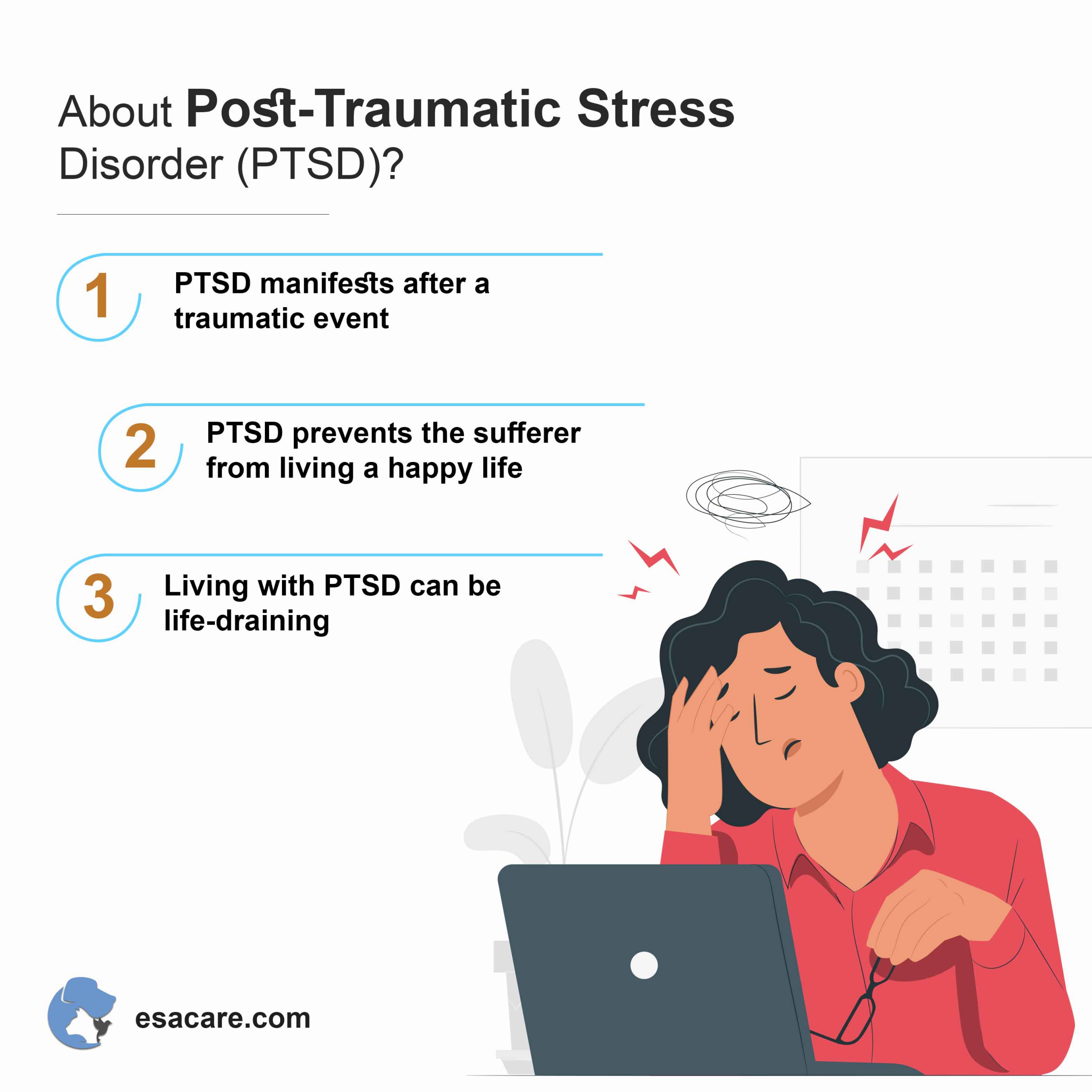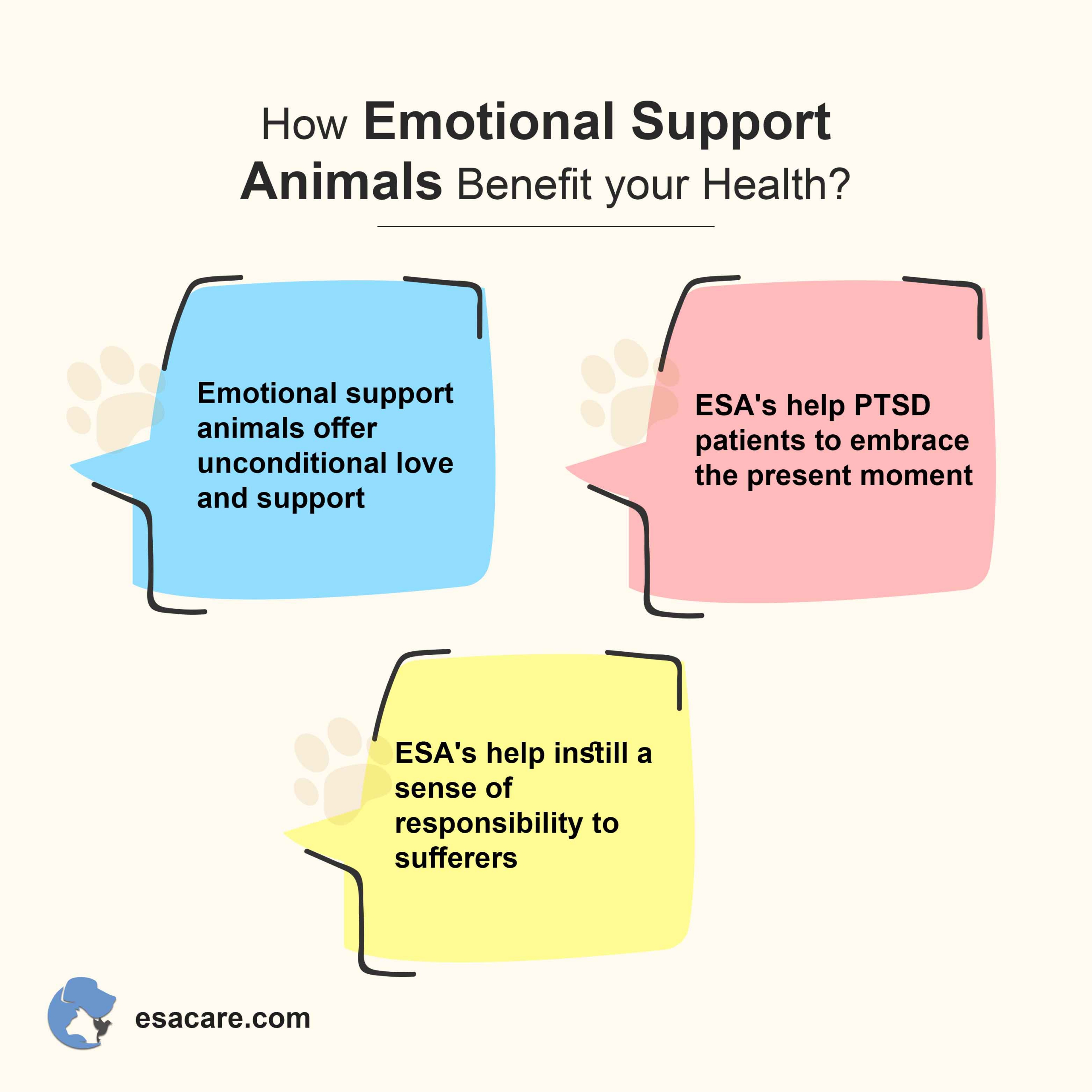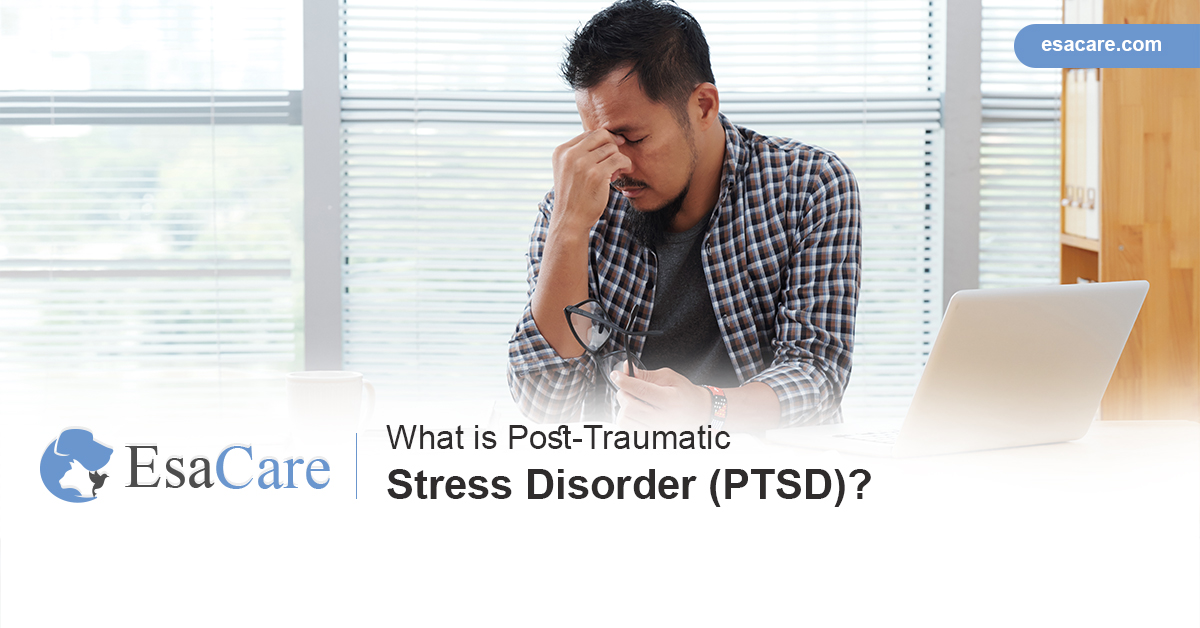What is Post-Traumatic Stress Disorder (PTSD)?
According to the National Centre for PTSD, an estimated 8 million Americans suffer from PTSD at one point in life. PTSD or post-traumatic stress disorder is a psychiatric condition that affects an individual after experiencing an extremely traumatic event. Such events can be a severe accident, sexual assault, murder, physical violence, or war. PTSD manifests in the form of nightmares or memories of the event, which lasts for months, a year, or a lifetime.
Having strong mental health is the key to a happy life – maintain it by getting your ESA letter today!
PTSD prevents you from living a happy, fulfilling life. The anxiety, flashbacks, and sad memories associated with PTSD affect your physical, mental, emotional, and financial life. Living with PTSD can be life-draining for most patients. To such patients, every day is a struggle to survive, not just the daily life hustles, but a struggle to win “a fight within.” Emotional support animals can make this journey bearable for PTSD patients.

About PTSD
What is an ESA?
Emotional support animal (ESA) refers to any pet, including dogs, cats, snakes, pigs, and other animals, which provide therapeutic support to the owner. According to the United States Department of Agriculture, the animal must be prescribed legally by a certified physiatrist to qualify as an ESA. Science supports the use of ESA as a supportive measure for patients recovering from PTSD for the reasons outlined below.
How an ESA can be Used to Treat PTSD
It is normal to feel calm, safe, and relaxed when surrounded by things and people that we love. Think of the last time that you cuddled your dog, do you remember how you felt? Science has proved that there is a strong relationship between cuddling and feeling calm and relaxed.
When you cuddle, the brain is stimulated to release Oxytocin or the love hormone. Oxytocin acts as a brain messenger, which triggers feeling happy, safe, and calm, which is precisely what a PTSD patient requires. If you are a PTSD patient, the next time you feel anxious, just cuddle your pet and feel the difference.
Click the button below to keep your ESA pet legally!
1. ESA instills a sense of control and responsibility to PTSD patients
Despair and frustration is a common symptom of PTSD. It can trigger feelings of failure and emptiness when you lose the ability to control your emotions, fear, worries, or life. In extreme cases of PTSD, patients become completely dysfunctional and have to rely on others for daily tasks like showering, driving, or cooking. Emotional support animals can help you regain a sense of responsibility and control. While taking care of your pet, you regain your confidence and a sense of and self-care like exercising while taking your dog for a walk.
2. ESA offers love and support
Animals love genuinely and purely. Your pet loves you unconditionally; when you are weak or strong, wrong or right, sick, or in good health, you can always count on your pet’s love and affection. Scientists believe that love inhibits the production of pro-inflammatory cytokines, both physically and emotionally, known to disrupt the human healing process.
Also, emotional support animals love you without judgment. Unlike humans who are prone to judging others, pets have proved to love genuinely. This support can help you to overcome resentment and hatred, which are common feelings among PTSD patients.
3. ESA can help you learn mindfulness
Mindfulness is defined as the ability to live in the moment. Paying attention to the present and accepting the past without judgment. The past haunts PTSD patients. When you learn to accept, forget, and let go of the past, you free yourself from the chains of PTSD. Instead of wondering what I should have done to avoid the rapists, murderers, or anyone who hurt you, choose to let go and live in the moment.
Pets live in the present, and they cannot recall the past. If you mistreat your dog in the morning, it will still run towards you in the evening when you come home. The inability to forgive and forget easily is the chain that traps PTSD patients in the past.
Mindfulness can support PTSD patients to recover in the following ways:
- Reduces stress and improves the ability to deal with stress.
- Improves emotion regulation ability in the body.
- Improves emotional intelligence and conflict resolution mechanism.
- Increases resilience and ability to fight challenges.
- Increases the ability to pay attention and concentrate on a single task.

How emotional support animals benefit your health?
4. ESA enables PTSD patients to become self-less
A study conducted by Manchester University revealed that in extreme cases, PTSD patients exhibited a symptom of lack of motivation to live. When you feel like you have tried your best, followed all treatments, went for therapy, and still feeling lost in your sadness. Pets, especially ESA, can give you a reason to live and something bigger than yourself. When you love your pet, you want to take care of it, make sure she is comfortable, or feed her, which gives you something to live for.
5. ESA increases exercise
If you have a pet, chances are you must go for a walk, run, play and go on playdates. Exercising has many health benefits for PTSD patients. When you exercise, the body is stimulated to release endorphins, stress releasing hormone. Thus, exercising enables you to relieve stress and anxiety, which are common symptoms of PTSD.
Having strong mental health is the key to a happy life – maintain it by getting your ESA letter today!
What do you require to own an ESA?
According to the US law on ownership of pets, the state recognizes ESA as a form of treatment for PTSD patients. Thus, PTSD patients are required by law to register their ESA and obtain the letter that grants the patients protection and rights relating to pets.
For instance, without an ESA letter from a certified provider like Esacare, you will be forced to pay up to $125 for your ESA every time you take a flight. Further, some landlords have policies that restrict ownership of pets in their properties. An ESA letter from Esacare can help you overcome these hurdles to enjoy a healthy and happy recovery from PTSD.











 347 5th Ave Suite 1402-112,
347 5th Ave Suite 1402-112,

Leave a Reply
Want to join the discussion?Feel free to contribute!